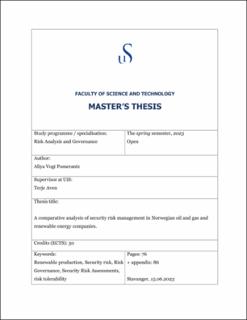| dc.description.abstract | With the recognised urgent need to combat climate change globally, the renewables industry has witnessed significant growth to meet ambitious net zero targets. This thesis aims to emphasize the importance of improving security risk governance to adapt to the evolving energy sector. The increasing adoption of renewable solutions and the expansion of renewable production presents a landscape characterized by uncertain and complex market dynamics. Additionally, these developments contribute to a more adverse threat environment driven by innovation in research and development (R&D), technology, and digitalization. Considering these advancements, criminal actors now have greater opportunity, motive, and increased capabilities, regardless of whether the company is focused on oil and gas, or renewable production. While damages to a renewables asset result in lower costs and less detrimental environmental impacts when compared to an offshore oil and gas asset, they can still have adverse implications on company values. Impacts to critical renewable assets have the potential to increase reliance on traditional fossil fuels, negatively impact local communities, and detrimentally impact company margins. Furthermore, due to market volatility and energy politics, nations aim to safeguard energy supply and reduce dependence on external sources. This is particularly relevant when considering the sanctions imposed on Russian oil and gas following the 2022 invasion of Ukraine. As a result, energy independence and energy security have become increasingly more critical.
This thesis has identified with certainty that there is a significant lack of maturity within security risk governance in renewables companies. Therefore, by comparing how both the oil and gas, and renewables sector acknowledge security and therein approach security risk management, a platform is created to offer fit-for-purpose recommendations to the renewables sector. Furthermore, this thesis acknowledges the lower margin nature of renewable production and ultimately emphasises fostering a sustainable and dynamic security culture that allows industry to strategically expand into higher security threat environments.
Key words: Renewable production, Security risk, Risk Governance, Security Risk Assessments, risk tolerability | |
